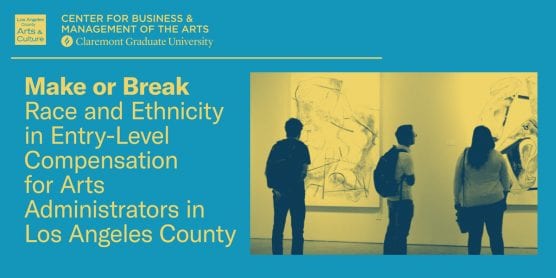A new report published by the Los Angeles County Department of Arts and Culture and Claremont Graduate University’s Center for Business and Management of the Arts revealed disparities between earnings of L.A. County arts administrators that identify as Black, Indigenous, and People of Color and their White counterparts.
The report also found that entry-level arts staff, no matter their race, earned wages lower than the cost of living in L.A. County. This study further highlights the relationship between wages and the perceptions, lives, and careers of arts workers, including education levels and the student debt incurred to get that education.
The report builds on a series of Arts and Culture studies aimed at building knowledge, equity, and inclusion in the arts through data and research.
It comes at a critical time as arts organizations emerge from the hardship of COVID-19 and begin to rebuild, rehire, and in some cases, reinvent themselves. It concludes with a series of recommendations that emerged from the findings to help arts organizations and funders address the challenges it brings to light.
Recent research has found that the creative workforce in Los Angeles County does not reflect the demographic makeup of the population—it is overwhelmingly female and White.
Report authors Cobi Krieger, CBMArts, and Bronwyn Mauldin, Arts and Culture’s Director of Research and Evaluation, along with adjunct faculty at CBMArts, sought to explore the relationship between entry-level compensation and diversity, equity, and inclusion in the nonprofit arts field.
The questions that drove their project included whether pay scales acted as barriers to certain groups of people and if the arts field practices a compensation structure that reinforces the historical exclusion of people of color.
To answer these questions, the report’s authors surveyed entry-level L.A. County arts administrators, defined as the people who work behind the scenes to support both the artists who create art and the public that experiences it.
They gathered and analyzed data about earnings, debt, education, outside financial help, and side gigs. They then conducted follow-up interviews to understand how those factors affected their subjects’ daily lives, their confidence in their career paths, and their sense of self-worth.
The arts administrators’ annual earnings from all sources were $36,847—slightly higher than the L.A. County minimum wage of $31,200, but lower than the living wage of $40,248.
Average annual earnings for entry-level arts administrators were $32,027 for BIPOC respondents and $43,437 for White respondents, a difference of $11,410, or 35 percent.

No matter their education level, White respondents on average earned more than BIPOC respondents.
“What this report reveals on income disparities cutting along racial lines is not surprising,” said Los Angeles County Board of Supervisors Chair Hilda L. Solis, Supervisor to the First District. “I believe, however, that we can use this knowledge to inform the future. We know that arts and culture play a critical role in the economic and social resiliency of Los Angeles County, and as we build our ecosystem back, we must build it back better—with equity and opportunity for all of our creative workers and arts administrators at all levels.”
“We as educators need to face these numbers head-on. They are a charge to rethink and transform how our arts and cultural institutions operate—higher education included—and to ensure we are building a creative infrastructure that serves and supports everyone,” said Jonathan T. D. Neil, Director of CBMArts.
“In the wake of COVID-19, we find ourselves in a moment of opportunity in the arts and culture sector. At the Department of Arts and Culture, we conduct research to share knowledge within the arts and increase understanding of its value in civic life. This report speaks to the experiences of arts workers, wages, and capitalization of the nonprofit arts sector—and highlights ways we can work collectively as a field to rebuild the arts sector equitably in recovery, reimagine our role in economic inclusion and expand anti-racist practice across individual, institutional, and systemic levels,” said Kristin Sakoda, Director of the Los Angeles County Department of Arts and Culture.
Like this:
Like Loading...
Related





 Tweet This
Tweet This Facebook
Facebook Digg This
Digg This Bookmark
Bookmark Stumble
Stumble RSS
RSS





























REAL NAMES ONLY: All posters must use their real individual or business name. This applies equally to Twitter account holders who use a nickname.
0 Comments
You can be the first one to leave a comment.